Kevin DeYoung's Blog, page 127
October 6, 2012
More Atrocious than Being Killed at Home
John Calvin, commenting on Exodus 21:22-25:
The fetus, though enclosed in the womb of its mother, is already a human being (homo), and it is almost a monstrous crime to rob it of life which it has not yet begun to enjoy. If it seems horrible to kill a man in his own house than in a field, because a man’s house is his place of most secure refuge, it ought surely to be deemed more atrocious to destroy a fetus in the womb before it has come to light.
October 5, 2012
The Life of a Critic
Let me get the caveats out first: there is nothing un-Christian about criticism. The Bible is full of criticism for false religion and false teachers. Jesus himself, right after instructing us not to judge (Matt. 7:1), insinuated some of his opponents were dogs and pigs (Matt. 7:6). Through the history of the church, criticism has helped to shape Christian doctrine and guard against heresies of every kind. We should not try to shut down criticism simply because it is criticism. Besides, if we fault the critics for being so critical aren’t we ourselves being critical?
But not all criticism is warranted. Much of it is a waste. Worse than waste, it is self-serving, hurtful, and needlessly divisive. That’s what makes this ending scene from Ratatouille so powerful. After learning that his delicious meal, one he loved as a kid, was cooked by a rat, the harsh foot critic Anton Ego reflects on his life as a critic. His review, especially the first few sentences, reminds us how much easier and safer criticism is than the risky, hard work of creating.
Again, criticism is acceptable, and sometimes even called for, in the Christian life. But living the life of a critic is no way to live. If our identity depends on constantly defining ourselves against someone else or some other group, if our closest friends are always formed by what we mutually oppose, if our first response is to find fault, if we tear down without ever attempting the hard work of building something up, if we only criticize leaders without ever having led, if put downs bring us more joy than praise, then we are likely making a lot of people miserable, including ourselves.
In which case, it’s time to take a hard look at Ego. Both kinds.
October 4, 2012
A New Beginning
[image error]This is big week for our church. After 36 years in our current facility, we are moving to a new building. This Sunday, October 7, we will hold our first worship services (9:00, 11:00, 6:00) at 841 Timberlane, a mile from MSU on the eastside of East Lansing.
University Reformed Church (which everyone around here calls URC) began in 1966 with a young church planter named Tom Stark. The church began on campus in the Alumni Chapel with a handful of students and a few families. In 1976 the church began worshiping at the site on Hagadorn Road. Over the years, the church grew from a few dozen at its inception to several hundred people when Tom Stark retired in 2002. The last five years we’ve experienced consistent growth. We ran out of parking first, then classroom space, and this fall we maxed out our worship area. Last Sunday we had over 700 attend our two morning services, with 100-150 college students and 50-75 internationals.
The process of finding a bigger facility has been a long one. We looked at different parcels, different buildings, and considered every option we could think of. We can see the Lord’s hand in it all. He has allowed us to sell our old facility to Michigan State and purchase a former church building from East Lansing Public School. With the sale of our old building and our own capital campaign we were able to purchase on Tuesday the new facility debt free. Surely the lines have fallen for us in pleasant places.
Although we are leaving our spot right across the street from campus, we are still very much a part of East Lansing, moving only 1.5 miles up the road. With shuttle vans running to pick up students, and our largest campus staff ever, we are still well positioned to reach out to Michigan State University. And with 46,000 students and a campus sprawling over several miles, the majority of students have always been a car’s drive (or bike ride) from our church. We are confident that our student ministry will only grow with the increased space at our new location.
We are also excited to be a part of a neighborhood for the first time. The Walnut Heights neighborhood behind MacDonald Middle School has been warm to welcome us to our new location. They’ve been great at welcoming my family too. We moved to the neighborhood over the summer to be closer to the church, be a part of the East Lansing community, and to have a little more space for our growing family. Our church will be hosting a Fall Festival on October 14 (beginning at 4pm) to meet our neighbors and thank them in person. We’ll have food for everyone, inflatables for the kids to enjoy, and free pies for each household.
I could take a week’s worth of blog posts to thank all the people at our church who have served long and hard to get us to this point, not to mention all the saints who have labored at URC over the years. I know I’m biased, but I think we have a remarkable church. I can’t think of a better one.
More importantly, I know there is no better Lord. God has blessed our church over 46 years with good teaching, strong fellowship, lots of students, marriages, funerals, births, and new births. Now he has blessed us with more space. May we use it for his glory and not for ours. Unless the Lord builds the house, those who build it labor in vain.
October 3, 2012
When We Confess Jesus As Lord
The following is an excerpt from a recent sermon I preached on Acts 2:29-36. The prose has been slightly edited for ease of reading, but I’ve tried to retain the sermonic, spoken feel as much as possible.
*****
Jesus is Lord.
And if he’s Lord over all, it means Jesus is my Lord. That’s what you’re saying when you confess Jesus as Lord. You’re saying, “Jesus can call the shots for my life. Jesus can tell me how I should think about myself and about marriage and about the world. Jesus is the one who has all authority in heaven and on earth. Not me. I am not an autonomous creature. I live to serve this Master.” That’s what you’re saying.
And when you believe that God raised Jesus from the dead, you’re not just saying, “Well, sure, resurrection. Meh. It doesn’t bother me. Sure, if a dead person wants to come back to life, okay by me. I mean, I’ve seen aliens and Martians and weird stuff before, whatever.” To believe in the resurrection is to believe it with boldness. You’re saying, “He lives and I’ll live. If he’s raised, then I can trust my whole life to him. If he really is the only person in the history of the world who died, did not stay dead, never died again, and rose to heaven, then this is the man I ought to spend my whole life following and give my whole life to worship.” That’s what you’re saying.
But no matter what we say, let’s be clear about one thing: Jesus is Christ and Lord whether we think he is or not. He’s not asking for your vote. He’s not standing there hat in hand just saying, “Will somebody down there please sing a song to me. I’m so lonely.” He does not depend on me or my affirmation of him. He is in heaven. He is at God’s right hand. He governs the church by his word and Spirit and no matter what any of us think or believe or decide, Jesus is now and forever will be Lord and Christ. He is not begging for you to be his Facebook friend and begging for more followers on Twitter. To be sure, Jesus issues a gracious invitation, but it’s not because he needs. It’s because he loves.
You can listen to the entire sermon and watch the whole thing here.
October 2, 2012
A Book and Two Bits About Busyness
My next writing project is a book on busyness. I meant to work on it this summer but ran out of time. Seriously.
I’m the best and worst person to write about busyness. It’s a problem in my life–one that I don’t throw out as some sort of humblebrag. I am genuinely trying to make sense of the busyness in my life. And judging by hundreds of personal conversations and observations, so are many other people.
Over the weekend at the Desiring God National Conference I had two thoughts about busyness, both prompted by something one of the other speakers said.
One came while listening to Ed Welch tell the story about a certain “Jane.” This Jane arrived to her first counseling appointment 45 minutes late and in a fluster. After promising to do better, she arrived just as late the second time. And the third time. And on and on. Jane didn’t mean to be late, just like she didn’t mean for her whole life to feel like an undisciplined failure. She had every intention to be on time and even planned carefully. But something would always come up. She’d stop to pray for someone or pull over to run an errand or say yes to a new request. Jane lived a priority-less life. Whatever was right in front of her became her number one priority. Welch called her a wonderful woman you’d never want to hire.
Jane seems like a mess, but her weakness is not all that strange. The degree of the problem may be unique, but the kind is certainly not. We all have trouble maintaining priorities. We tell ourselves that daily devotions, family time, and regular exercise are priorities, but they quickly get crowded out by other things we never meant to make so important. When my life feels out of control it’s usually because I’ve lived just like Jane. I plan well and have good intentions, but somewhere along the way I say yes to too many things and made the one thing I really needed to do impossible to be done (or at least done well). The inability to establish priorities is madness, which is why busyness feels so crazy.
The second thought came during a conversation with Fernando Ortega. As a big Fernando fan for many years, I was excited to be sitting next to him at our speaker’s dinner. In the course of conversation I learned that Fernando has a family connection in East Lansing. I quickly motioned to him that we should get together sometime when he’s in town. He liked that idea. Then I pressed a little further and suggested he lead worship for us some Sunday when he’s in Michigan. Fernando quickly and graciously demurred, explaining that he needed to be at his church on weekends and couldn’t lead worship in other churches.
I was not at all offended by his response. In fact, I respected him for letting me know it probably wouldn’t work. My tendency is to be overly accommodating when put on the spot like that. I was thankful that Fernando would know his priorities and not change them on a whim. I assured him that his response made perfect sense.
To conquer busyness we need not only to set priorities, but to respect that others must set them too. This means understanding when people say no. It sometimes means not asking in the first place. Obviously, we shouldn’t say no to everything. We should be inconvenienced at times. It’s not always wrong to press someone for a favorable response. But simply remembering that most everyone else feels as busy as you do could do a lot to help everyone’s feeling of busyness. Don’t always expect the lunch request to work or a that you’ll get a reply to the “what-do-you-think?” email. Don’t be offended if your inquiry doesn’t go to the top of the pile. We all have priorities, and unless you’re God, none of us deserve to be the priority for everyone else all the time.
I still have a lot to learn about busyness, even more to put into place. But these two reminders are crucial: set priorities and let other people do the same.
October 1, 2012
Monday Morning Humor
September 28, 2012
More Book Briefs
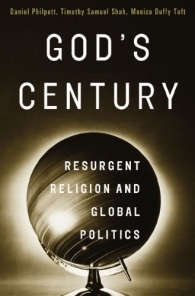 Monica Duffy Toft, Daniel Philpott, Timothy Samuel Shah, God’s Century: Resurgent Religion and Global Politics (Norton 2011). This a timely and well-reasoned book. Writing in the Samuel Huntington stream of foreign policy thought, the authors make a persuasive case that religion does currently and will continue to play a critical role in global politics. They make a case for the positive role religion can play and are strong advocates for religious freedom. Even if the book proves to be too unfamiliar or too scholarly for some, you will find the concluding chapter “Ten Rules for Surviving God’s Century” provides an accessible summary and charts a commonsense way forward.
Monica Duffy Toft, Daniel Philpott, Timothy Samuel Shah, God’s Century: Resurgent Religion and Global Politics (Norton 2011). This a timely and well-reasoned book. Writing in the Samuel Huntington stream of foreign policy thought, the authors make a persuasive case that religion does currently and will continue to play a critical role in global politics. They make a case for the positive role religion can play and are strong advocates for religious freedom. Even if the book proves to be too unfamiliar or too scholarly for some, you will find the concluding chapter “Ten Rules for Surviving God’s Century” provides an accessible summary and charts a commonsense way forward.
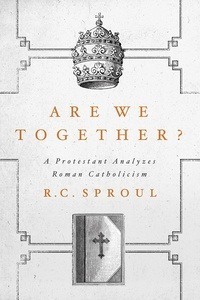 R.C. Sproul, Are We Together? A Protestant Analyzes Roman Catholicism (Reformation Trust 2012). Here’s my blurb: “This is a terrific book, one I have been hoping to find for a long time. Sproul firmly and rightly defends the faith of the Reformation, but without resorting to rancor or caricature. He takes great pains to be fair to Rome, considering the nuances of the Catholic Catechism and the significance of Vatican II. This will be the first book I recommend when either Protestants or Catholics ask me what is the difference between the two.”
R.C. Sproul, Are We Together? A Protestant Analyzes Roman Catholicism (Reformation Trust 2012). Here’s my blurb: “This is a terrific book, one I have been hoping to find for a long time. Sproul firmly and rightly defends the faith of the Reformation, but without resorting to rancor or caricature. He takes great pains to be fair to Rome, considering the nuances of the Catholic Catechism and the significance of Vatican II. This will be the first book I recommend when either Protestants or Catholics ask me what is the difference between the two.”
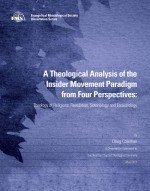 Doug Coleman, A Theological Analysis of the Insider Movement Paradigm from Four Perspectives: Theology of Religions, Revelation, Soteriology and Ecclesiology (WCIU Press 2011). Yes, this is a dissertation. And yes the book is entirely unattractive and looks intimidating. But it is eminently worth your time. This is the best full length scholarly assessment of the Insider Movement I’m aware of. Coleman is fair, respectful, and even-handed in interacting with Kevin Higgins, Rebecca Lewis and other IMP proponents. He also puts forward a cohesive and careful critique of IMP on theological and exegetical grounds. I hope Coleman will publish this dissertation, in a slightly more accessible version, with a major Christian publisher. It is a very good work and very important.
Doug Coleman, A Theological Analysis of the Insider Movement Paradigm from Four Perspectives: Theology of Religions, Revelation, Soteriology and Ecclesiology (WCIU Press 2011). Yes, this is a dissertation. And yes the book is entirely unattractive and looks intimidating. But it is eminently worth your time. This is the best full length scholarly assessment of the Insider Movement I’m aware of. Coleman is fair, respectful, and even-handed in interacting with Kevin Higgins, Rebecca Lewis and other IMP proponents. He also puts forward a cohesive and careful critique of IMP on theological and exegetical grounds. I hope Coleman will publish this dissertation, in a slightly more accessible version, with a major Christian publisher. It is a very good work and very important.
September 27, 2012
Book Briefs (Dutch Reformed Edition)
 Idzerd Van Dellen and Martin Monsma, The Church Order Commentary: A Brief Examination of the Church Order of the Synod of Dort (Credo 2009 [1954]). This reprint is not for everyone. Okay, it’s for hardly anyone. But it is for some people. If you are a BCO wonk-and a few people should be-then this is a helpful look at polity in the Dutch Reformed tradition. I didn’t read the whole book, but I have used it some and plan to keep it close at hand as an important reference work. Of note regarding current RCA polity wrangling: this commentary argues that Synod can make binding decisions to which members in the minority are required to submit.
Idzerd Van Dellen and Martin Monsma, The Church Order Commentary: A Brief Examination of the Church Order of the Synod of Dort (Credo 2009 [1954]). This reprint is not for everyone. Okay, it’s for hardly anyone. But it is for some people. If you are a BCO wonk-and a few people should be-then this is a helpful look at polity in the Dutch Reformed tradition. I didn’t read the whole book, but I have used it some and plan to keep it close at hand as an important reference work. Of note regarding current RCA polity wrangling: this commentary argues that Synod can make binding decisions to which members in the minority are required to submit.
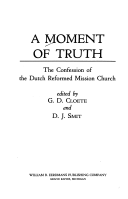 G.D. Cloete and D.J. Smit, eds., A Moment of Truth: The Confession of the Dutch Reformed Mission Church 1982 (Eerdmans 1984). This book explores the reasons for the Belhar Confession as a necessary word against apartheid in South Africa. While the background information and theological analysis are historically helpful, one’s opinion of the book depends largely on one’s opinion of Belhar itself. For my part, I found the contention that Belhar’s meaning is yet to be determined (60) and the discussion of the poor and social justice (53-65, 127-150) to be weaknesses.
G.D. Cloete and D.J. Smit, eds., A Moment of Truth: The Confession of the Dutch Reformed Mission Church 1982 (Eerdmans 1984). This book explores the reasons for the Belhar Confession as a necessary word against apartheid in South Africa. While the background information and theological analysis are historically helpful, one’s opinion of the book depends largely on one’s opinion of Belhar itself. For my part, I found the contention that Belhar’s meaning is yet to be determined (60) and the discussion of the poor and social justice (53-65, 127-150) to be weaknesses.
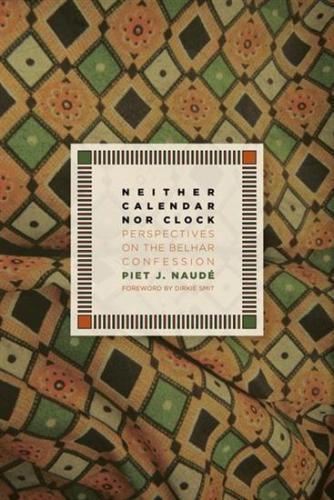 Piet J. Naude, Neither Calendar Nor Clock: Perspective on the Belhar Confession (Eerdmans 2010). When the RCA voted to provisionally approve the Belhar Confession in 2007, the South African theologian and Belhar expert Piet Naude addressed Synod. I was there and heard him speak. If Naude said everything at that Synod that he said in this book, I don’t believe Belhar would have been approved. Naude is clearly a man of the left with harsh criticism for the United States and the policies of conservatives in particular (xviii, 184, 217). He seems uncomfortable with the traditional language of Father, Son, and Holy Spirit (6). He assumes hominid evolution (170). And most dramatically, he sees in Belhar a deep suspicion against the exclusion of women from church office (187). Naude comments: “When the Bible and theology are used against women in order to keep them, in the name of the gospel, from exercising their spiritual gifts of teaching or leadership, they show exactly the same structure as a racist theology” (188). Again on the next page, in another bit of harsh hyperbole, Naude asserts, “It was relatively easy to see apartheid theology as an ideology. It is a little more difficult to deconstruct a patriarchal and heterosexual culture, supported by a fundamentalist reading of Scripture, as an equally vicious ideology that has to be resisted today” (189). Given this comment, as well as Naude’s reference to “gay and straight Christians” (189), and his appreciation for the URCSA wrestling with the place for gay people in the church, it seems highly unlikely that Naude accepts a biblical understanding of marriage or sees any problem with using Belhar to further a revisionist agenda in this area.
Piet J. Naude, Neither Calendar Nor Clock: Perspective on the Belhar Confession (Eerdmans 2010). When the RCA voted to provisionally approve the Belhar Confession in 2007, the South African theologian and Belhar expert Piet Naude addressed Synod. I was there and heard him speak. If Naude said everything at that Synod that he said in this book, I don’t believe Belhar would have been approved. Naude is clearly a man of the left with harsh criticism for the United States and the policies of conservatives in particular (xviii, 184, 217). He seems uncomfortable with the traditional language of Father, Son, and Holy Spirit (6). He assumes hominid evolution (170). And most dramatically, he sees in Belhar a deep suspicion against the exclusion of women from church office (187). Naude comments: “When the Bible and theology are used against women in order to keep them, in the name of the gospel, from exercising their spiritual gifts of teaching or leadership, they show exactly the same structure as a racist theology” (188). Again on the next page, in another bit of harsh hyperbole, Naude asserts, “It was relatively easy to see apartheid theology as an ideology. It is a little more difficult to deconstruct a patriarchal and heterosexual culture, supported by a fundamentalist reading of Scripture, as an equally vicious ideology that has to be resisted today” (189). Given this comment, as well as Naude’s reference to “gay and straight Christians” (189), and his appreciation for the URCSA wrestling with the place for gay people in the church, it seems highly unlikely that Naude accepts a biblical understanding of marriage or sees any problem with using Belhar to further a revisionist agenda in this area.
September 26, 2012
God Planned That He Would Live
The following is an excerpt from a recent sermon I preached on Acts 2:22-28. The prose has been slightly edited for ease of reading, but I’ve tried to retain the sermonic, spoken feel as much as possible.
*****
It was not possible for Jesus to stay dead because God had already planned that he would live. We see in Acts 2:23 this picture of a big sovereign God, a God who accomplishes whatever he purposes.
Now yes, there’s always human responsibility. The Jews who crucified him, the lawless Romans who nailed him up on that tree, they were guilty, they were sinners. But this was under the plan of a mighty, sovereign God.
This Jesus delivered up. . . .now what would you say? This Jesus delivered up by a strange twist of fate? This Jesus delivered up by one of the great tragedies of history? This Jesus delivered up in what was a colossal mistake, a huge misunderstanding, a terrible accident? That’s not what Peter says: Jesus was delivered up by according to the definite plan and foreknowledge of God.
Whatever God plans cannot be other than he has planned it. And God planned for Jesus to die. And planned that he would not stay dead. He had to be raised.
When you think in your life “How could God possibly bring good out of this situation? How could he possibly be sovereign over this much pain in my life? You can’t possibly be telling me that somehow God has planned this or God has sent this to me?” When you think all that, remember: he planned the cross. He planned every bit of it—the betrayal, the hatred, the arrest, the flogging. And he planned it all for a glorious purpose, that Jesus would die and he would not stay dead.
You can listen to the entire sermon and watch the whole thing here.
September 25, 2012
The Next Resurgence?
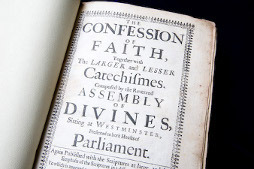
Guest Blogger: Jason Helopoulos
The resurgence of Reformed theology over the past ten years has been very exciting. I am hopeful that the next resurgence will find the YRR folks making their way to a more explicit adherence to confessional reformed theology.
What are the benefits to confessional Christianity? I think about it this way. The confessions and/or creeds are helpful because they:
Tie us to Scripture
We must understand the whole of what the Bible teaches concerning a certain subject. And the confessions are a faithful attempt to do this very thing. Thus, the confessions do not lead us away from Scripture. Rather, they lead us to the Scriptures in what they articulate in a systematic way.
If I asked you, “How many persons are there in the Godhead?” You could turn to John 10:30 where Jesus states, “I and the Father are one,” and make the argument, as some have, that God is one person. But this would be wrong, because you took the Scriptures only in part and not as a whole. A good student of the Scriptures must be informed by all the Scriptures. Therefore, you would also want to turn to Matthew 3:16-17. And there it is clear that there are three persons of the Triune Godhead distinguished one from another. But you couldn’t stop there. One must also look at passages like John 15:26, 2 Corinthians 13:14, Galatians 4:6, Colossians 1:15, Hebrews 1:2-3, and on we could go. All of this needs to be considered together as a consistent whole.
Tie us to Orthodoxy
These confessions and creeds are the products of painstaking dialogue, theological wrangling, and years of hard fought established truths. The Church has never existed in a vacuum as heretical teaching has found its way into the church in every age. And many of these teachings have struck at the vitals of our faith. In such cases, the Church has often risen to address these errors and safeguard itself by articulating the truths of Scripture in carefully worded documents. As we read, study, and compare these confessions/creeds to the teaching of Scripture they encourage our own orthodoxy and serve to check our own inclination to theological wandering.
Tie us to the past
The Church of Jesus Christ is older than any church we sit in on Sunday mornings. For that fact, it is older than any of our denominations. Confessions bind us to the historical church. It helps to stymie fascination with whatever is fadish and expedient. It encourages trust and waiting upon the Lord as one reflects upon the faithfulness of God through the generations. It reminds us that the Church to which we belong is nothing new. It includes all those in the faith who have preceded us. It directs us to old teachers and teachings in the church that have stood the test of time and scrutiny.
Tie us in the present
The confessions allow us to have true unity and accord with others in the faith. It provides the basis for ecclesiastical fellowship, ministry endeavors, labor together, and accountability.
Tie us to the future
Confessions (and their attendant catechisms in particular) provide a means to pass this great faith on to those of the next generation. Every Christian must have a concern for the Church in the next age. We labor to pass on the faith to our children and grandchildren. And the confessions provide a wonderful pedagogical tool for our use. They summarize our faith and articulate the essentials. They provide a systematic and concise understanding of what “man is to believe concerning God and what duty God requires of man” (WSC Q/A 3).



